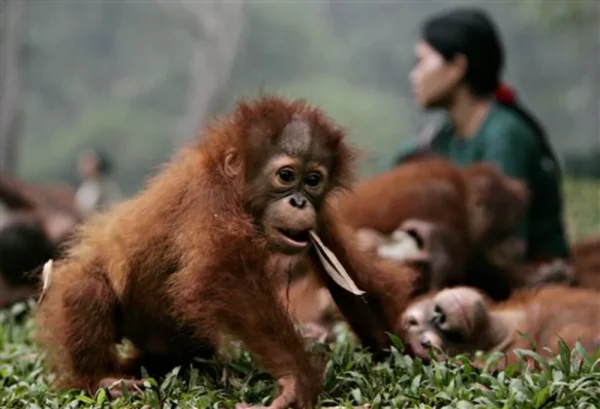The Bornean orangutan, living in lush tropical forests, was once known as a symbol of strong and unique wildlife. However, as its habitat has been severely devastated by logging and agricultural expansion, food scarcity has become a major challenge for the survival of this species. Especially when fruit — their main source of food — has become increasingly rare, some orangutans have had to resort to a desperate survival strategy: digesting their own muscles to stay alive.

Research by Erin Vogel at Rutgers University, USA, revealed a concerning fact. After five years of studying wild orangutans, Vogel found that when orangutans lacked fruit for an extended period, their urine started containing nitrogen compounds, a clear sign that their bodies were digesting their own muscles for protein. “They are actually digesting their muscle cells, when there are no more food sources available,” Vogel shared in a study published in Science in 2011.
“When there is no fruit in their diet, Bornean orangutans are forced to switch to eating leaves and bark, but they cannot digest these food sources very well. Eventually, in extreme scarcity, they will start to digest their own muscle tissue to obtain enough energy to survive.” — Erin Vogel, Rutgers University, USA (2011)
These findings not only reflect the dire condition of the orangutans but also expand the story to humans. We can learn important lessons from this survival strategy, particularly in food scarcity situations. The human body, when faced with prolonged starvation, can also begin to digest its own muscles to sustain life, which is especially dangerous for those with conditions like anorexia or malnutrition.
Moreover, the orangutans’ habitat issue is also a serious concern. With tropical forests being cut down, Bornean orangutans have very little space left to live. This not only threatens their survival but also serves as a warning to us about the sustainability of the natural environment and the need to protect it. If we do not act promptly to protect the rainforests and plant more trees, orangutans may only be a memory in the future.

In this context, protecting forests and the habitats of wildlife should be considered a top priority. This not only helps orangutans but also protects biodiversity globally. Additionally, the story of the orangutans digesting their muscles reminds us of the importance of maintaining our health, especially in difficult circumstances. Understanding the changes in hunger hormones like ghrelin and leptin can help us develop appropriate nutritional strategies to maintain health in times of scarcity.
From the heartbreaking story of orangutans, we can draw a lesson on the importance of protecting wildlife habitats and taking care of our own health, so that we do not end up in desperate situations like the orangutans in nature.


HPX24h > Animals > The Survival of Orangutans: When Endangered Orangutans Have to Digest Their Own Muscles to Survive
Top Reads from This Category
Animals
The Stunning Image of a Cheetah in Action During Its Hunt
Animals
Stickleback Fish’s Secret to Adapting from Saltwater to Freshwater: How Genetic Mutations Enable Remarkable Adaptation
Animals
Ravens Use Gestures to Find Mates: A New Discovery About Their Intelligence
Animals
Can Hyena Dogs Be as Smart as Primates?
Animals
Bee Wax Bust of Nefertiti: The Perfect Fusion of Art and Nature
Animals
Decoding Whale Songs: When the Community Joins to Uncover the Ocean’s Mysteries
Animals
Gibbons Develop Vocal Techniques as Powerful as Humans: New Discoveries About Their Unique Sounds
Discover New Topics
Science
Your Body Is Not the Same as It Was 10 Minutes Ago: The Continuous Regeneration Process of the Human Body
Health
Why You Shouldn’t Skip a Protein-Rich Breakfast
Animals
The Survival of Orangutans: When Endangered Orangutans Have to Digest Their Own Muscles to Survive
Fitness
How Often Should You Work Out Each Week for Effective Weight Loss and Muscle Gain?
Science
Enhancing Memory with Brain Implants: A New Scientific Revolution
Animals
The Secret Behind Turtle Eggs Hatching at the Same Time: A Fascinating Reason
Healthy Eating
MIND Diet – The Secret to Protecting the Brain and Preventing Cognitive Decline
Parenting Tips
The Way to Help Preschoolers Understand How Babies Are Made
Parenting Tips
Why Do Preschoolers Have the Habit of Nose Picking?
Science
Artificial Intelligence Outperforms Humans in Treating Depression
Science
Discover Blood Testing Technology Without a Visit to the Doctor
Parenting Tips
How Much Sleep Do Children Really Need?
Healthy Eating
The optimal diet for leaky gut syndrome: Scientific solutions and practical advice